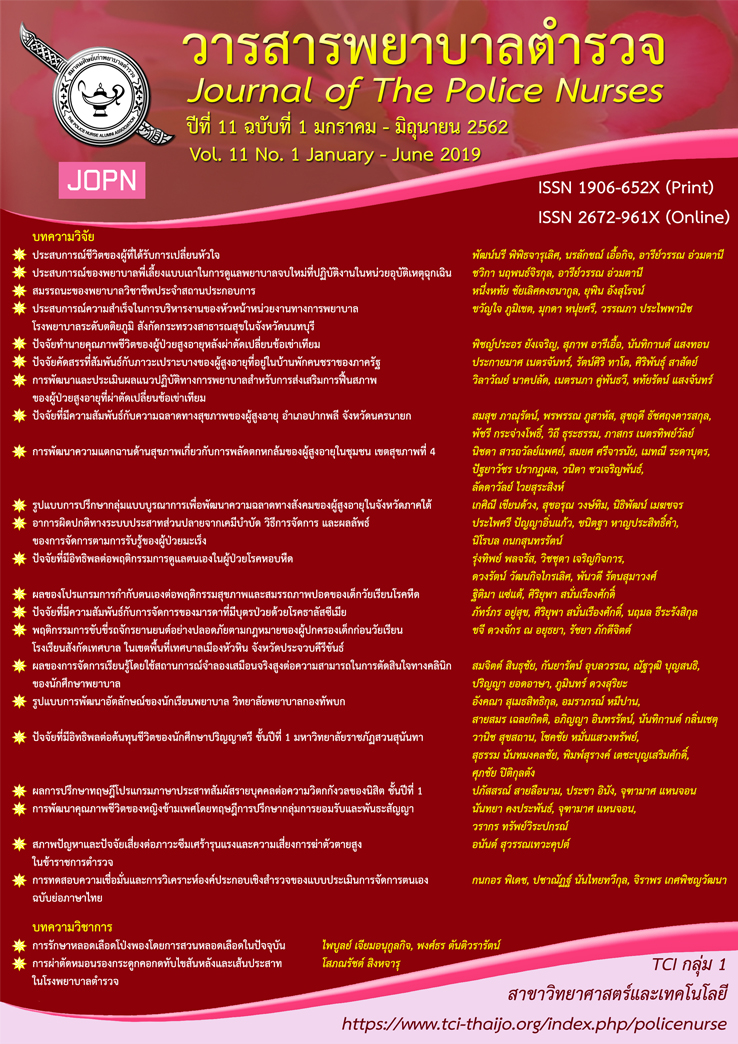CONDITIONS AND RISK FACTORS OF SEVERE DEPRESSION AND HIGH SUICIDE RISK AMONG THAI POLICE OFFICERS
Keywords:
risk factors, severe depression, high suicide risk, Thai police officersAbstract
This research aimed to study severe depression and high suicidal risk among Thai police officers. Method of data collection was done through a self-screening questionnaire for depression 9Q and self-screening questionnaire for suicide 8Q. The participants were 112,989 Thai police officers who had received an annual health check with the Police General hospital from January to September 2018. The data were analyzed by descriptive statistics; percentage, frequency and odds ratio was used to analyze the relationship of factors at 95% confidence intervals.
This study showed that Thai police officers that participated in this research study had severe depressive symptoms only .07% and severe suicidal risk .05%. The most influencing factor for severe depression are their work problems, including excessive workload, difficult job and not capable with people, personal life problems, and family problems. Factors that affect high suicidal risk are social and family problems. From this study, it can be used for planning to promote mental health and prevent depression and suicide among Thai police officers and make policy recommendations to the Royal Thai Police Headquarters.
Downloads
References
Beck, A. T. (1967). Depression: Clinical, experimental, and theoretical aspects. New York, NY: Harper Row.
Beck, A. T., Shaw, B. F., & Emery, G. (1979). Cognitive therapy of depression. New York, NY: Guilford.
Chaiyaphum Provincial Health Office Office of Information. (2012). Warning from ministry of public health: The silent impacts of depressive disorder across all age over 15 years old (1.5 million patients). Retrieved from https://cpho.moph.go.th/wp/?p=7567
Cutcliffe, J. R., & Barker, P. (2004). The nurses' global assessment of suicide risk (NGASR): Developing a tool for clinical practice. Journal of Psychiatric and Mental Health Nursing, 11(4), 393-400.
Department of Mental Health. (2016). Survey of mental health population in 2016. Nonthaburi: Ministry of Public Health.
Department of Mental Health. (2019). Report on access to provincial depressive disorder services and the overall service network of Thailand. Nonthaburi: Ministry of Public Health.
Frisch, C. N., & Frisch, E. L. (2002). Psychiatric mental nursing health nursing: Understanding the client as well as the condition (2nd ed.). Kansas: Delma.
Mackenzie, T. B., & Popkin, M. K. (1990). Medical illness and suicide. In S. J. Blumenthal, & D. J. Kupfer (Eds.), Suicide over the life cycle: Risk factor, assessment, and treatment of suicide patients (pp.39-96). Washington: American Psychiatric Press.
Luebunthawatchai, O., & Luebutthawatchai, P. (2010) Psychosocial therapy for depression. Bangkok: Chulalongkorn University Publishing House.
Sinloima, P., et al. (2016) Guidelines for the management of police officers welfare system. Bangkok: Thailand Research Fund.
Sudsukh, U., Charupoolphol, P., Fongsatitkul, P., Kewwalin Sarit, J., Chantarat, S., Siengsanau, J., . . . & Kahattha, V. (2009). The Study of situations, on a activities of daily living, needs, and quality of life of the elderly. Bangkok: Senior Intellectual Property Association of Thailand.
World Health Organization. (2002) Mental Health: Responding to the call for action. Fifty-fifty world health assembly. Retrieved from http;//www.WHO.org
Downloads
Published
How to Cite
Issue
Section
License
ผลงานที่ได้ตีพิมพ์แล้วจะเป็นลิขสิทธิ์ของวารสารพยาบาลตำรวจ















